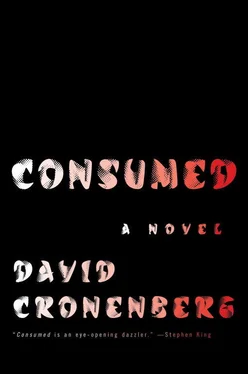I pulled away from Célestine in horror and confusion, and she laughed a small, sympathetic laugh and released her breast, which seemed for one hallucinatory moment to ripple with inner turmoil before finding its innocuously normal position of gravitational repose. It was, as I’ve said, my favorite breast, the larger and more accommodating one (the left one is usually larger, apparently because of the way the heart pumps blood), but now this breast was overwhelmed by waves of meaning and symbolism even beyond the metaphorical freight which those long-suffering organs are accustomed to bear. It dissolved almost cinematically before my eyes into a rapidly cycling series of objects—a bag, a nest, an egg, a yurt, a hive—each one of which provoked an excruciating emotional response which left me trembling and drained.
“You know now, don’t you? You know now,” she said, studying my every tremor with involved curiosity.
But I didn’t know. For obvious reasons, I could not believe my ears—in the most literal sense. It occurred to me that the insect sounds I thought I heard were actually being generated by my hearing instruments themselves, and not being passively received by them. Could they not have been programmed to fabricate those sounds, their creative computing power barely stressed by what they were ordinarily required to do? Could Romme, in concert with Elke, have constructed this unlikely elaborate scheme in order to drive me insane or, even more perversely, to seduce me into collaborating with Célestine in the deepening of her own insanity?
The look on Célestine’s face was so benign—no, more, benevolent, even saintly—effortlessly overflowing with compassion and understanding and kindness, that I could not bring myself to voice these cavils at what was obviously a near-religious cathexis for her. And then again, I could still hear them, and I had the sense they were speaking to me, though I could not understand what they were saying.
I could understand what Célestine was saying. “Now you see why we have to cut this off. We have to do it before they spread everywhere. We don’t have much time.” She said this sweetly, gently, without apprehension. It disturbed me that she said “we,” though her desire to have my approbation and support was normal for us; but in this context, it discharged a sinister undertaste which must have altered my expression. “I want you to do it,” she said. “Why would you leave it to anyone else? It’s something we’ve talked about, and now it’s here.”
I imagine it’s incomprehensible to a young couple that they might one day be talking in many modalities—sometimes joking, sometimes despairing, sometimes brutalizing—about killing each other or mutilating each other. It’s common enough to find articles about the ethics of euthanasia and pulling the plug on your spouse under dire medical circumstances, or the logistics of accompanying your wife to the Dignitas clinic in Zürich to end her life, but Célestine and I often found ourselves proposing hypothetical acts of violence which only peripherally had to do with aging, senility, and easeful death. She would castrate me; I would cut off her breasts—both surgeries committed with kitchen utensils ready at hand. She would strangle me with an old bathrobe belt; I would stab her with the twin-horned, sharp-pointed titanium sculpture I was awarded for my pamphlet “Consumerist Cinema”; we would take an overdose of barbiturates and lie down in our bed together, holding hands, in the manner of The World of Yesterday ’s author, Stefan Zweig, and his young wife, in the Brazilian city of Petrópolis. We offhandedly devised many imaginary scenarios during the course of any given day, a habit that began as acerbic banter between two hypersharp intelligences, whose function seemed to be to absorb the venom of normal mundane tensions, anxieties, jealousies, resentments, and nano-betrayals, but gradually transformed into a daily hedge against death, an acknowledgment of our painful ephemerality, and a bid to take the kitchen utensils of mortality out of the hands of happenstance and put them back into our own drawer.
You can begin to understand, then, the accumulation of circumstances that created our gestalt. I went from humoring Célestine, not certain whether she was beginning to suffer from dementia or was, rather, deliberately developing a fantasy, a willed hallucination involving a unique form of apotemnophilia, to inhabiting this complex psychosis completely. It’s too bad you never got to sit in a room with Célestine. You would have felt her power to seduce and hypnotize.
THE NIGHT TRAIN TO MUNICH left Paris Est at 20:05 and was the first leg of our journey to Budapest. We had chosen the City Night Line Schlafwagen Cassiopeia, operated by Deutsche Bahn, to be followed by Austrian Railways’ Railjet high-speed train into Budapest’s Keleti station, in order to accommodate Célestine’s newly emerged fear of flying, or rather her fear of cabin pressure change, which might aggravate her own small passengers. It can’t be denied that the sense of occasion promoted by many hours of rail travel was also part of the transit stratagem, meant to validate the purpose of our trip and to lend the whole enterprise some of the credibility which it was lacking. For one must ask, as I’m sure you are, just how insane was Célestine, and how irresponsible was I to be complicit in that insanity. She was so convincing in the invention of the details of her malady and the conspiracy surrounding it that it took on a compelling substantiality, like being swept into the reality of a brilliantly written novel or charismatic movie: it’s not that you believe in its literalness, but that there is a compelling truth in its organic life that envelops you and is absorbed by you almost on a physiological level. I remember experiencing a small earthquake in Los Angeles—only a four-point-six, I think—when I was there as a guest of the Academy the year they decided to develop a special Oscar for Philosophy in Cinema. A small earthquake, and yet the forced awareness that the earth beneath your feet was volatile, not stable, was terrifying, and for days afterwards I was sure I could feel the earth trembling and threatening. I live with it still; it is ready to strike me at any moment, a special vertigo which is now part of my very physiology.
Célestine was like that earthquake. Célestine was also like that first LSD trip, the one you perhaps took in a deli in Brooklyn, where suddenly the colors all shifted towards the green end of the spectrum and your eyes became fish-eye lenses, distorting your total visual field, and the sounds became plastic, and time became infinitely variable, and you realized that reality is neurology, and is not absolute. Célestine was a personal hotspot, emitting her own special Wi-Fi signal which connected you to the Célestine web, and only the Célestine web. There was of course an element of unconditional support, a solidarity with one’s primary partner in the world adventure no matter where it took you both. I was now shoulder to shoulder with Célestine at the barricades, just as she had been with me during my shortlived lunatic political career (which almost landed us both in prison and taught us the old lesson about philosopher-princes).
We took a deluxe two-berth Comfortline compartment with an en suite toilet and even a shower, complete with toiletries, which we never used. Unusually, Célestine wanted the upper berth, which she normally said made her feel like a piece of carry-on luggage stowed in the overhead bin, but now made her feel as though she were flying over the green canopy of a Caribbean island rain forest. She clambered up the white metal ladder, hooked to the upper berth by our resolutely cheerful sleeping-car attendant, like an eight-year-old girl on her first trip away from home. I must confess that the perforated plastic card-key lock system and security dead bolt inside the compartment completely killed that old Orient Express sense of exotic bonhomie, and replaced it with the feeling that one had been admitted to a rolling minimum-security prison for white-collar criminals heading, possibly, to the grotesquely ornate St. Gilles lock-up in Brussels. (For some reason, I flashed that the criminal/philosopher/artist Jean Genet was also riding on this prison train and was feeling quite at home.)
Читать дальше
Конец ознакомительного отрывка
Купить книгу







![David Jagusson - Fesselspiele mit Meister David [Hardcore BDSM]](/books/486693/david-jagusson-fesselspiele-mit-meister-david-har-thumb.webp)




